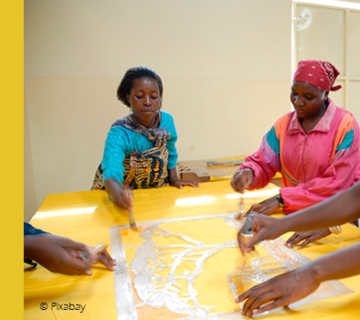Special delivery: the Espiga Dourada bakery at the gates of Mariapolis Ginetta in São Paulo, Brazil reaches out to its customers throughout the pandemic.
“This crisis has changed everything. But at the same time it’s given us a new vision, a more beautiful and more free vision, I’d say. We’ve become aware of poeple’s needs like never before,” said Adriana Valle, an Italian Focolarina who transferred to Brazil over 40 years ago. She runs the Espiga Dourada (Golden Wheat) bakery located just outside the Focolare little town Mariapolis Ginetta, near São Paulo city. What began in 1988 as a street enterprise selling home-baked bread to passing commuter traffic, eventually developed into a well-established bakery and cafeteria. From the start, its customers found so much more than simple loaves of bread. It fast became an important and encouraging part of many people’s daily lives, and not even Covid could put a stop to this mission!
“The pandemic came so unexpectedly that all our plans were thrown in the air,” continued Adriana. “Actually we were one of the few businesses allowed to stay open, but the new directives did not permit us to work normally. We weren’t allowed to be anywhere near other people or to serve tables. The customers could enter and quickly collect their bread, but with absolutely no time to chat. However many people no longer left their homes at all, and we asked ourselves what we could do for these people to get our products to them and also to let them feel we were close to them in such a difficult period. So we decided to start our own delivery service. We took on a friend of the Focolare Movement who was looking for work, supplied him with a small truck and we were ready to start deliveries. Orders came flooding in. We developed new products, began offering hot meals and packages of food essentials. We received very positive feedback on how happy our customers were. Throughout this period, thanks to God’s Providence, we’ve managed to survive every economic crisis which has allowed us to keep on all our staff”.
What have you been through in this period?
“We’ve seen real miracles of love throughout the pandemic. On Mothers’ Day last year, Brazil was still in lockdown. So we received many orders from the children of our clients who wanted us to provide gift hampers to their mothers they couldn’t visit in person. As we know many of our clients very well, we were able to prepare tailor-made hampers to each one’s taste and design greetings cards. We worked flat out, day and night, in that period. And the same again over Christmas. To ease the solitude of people, even just with a smile, is priceless.
The pandemic has also meant we’ve got to know our employees better. Many travel to work by public transport and so were putting their own health at risk every day. Some Focolarini and youth from around Mariapolis Ginetta offered to drive to collect them in the morning and take them home again in the evening. A real network was created. It also meant we got to know each other’s home situations more than before and we saw that some of our employees were enduring serious hardship. We tried to act as a family and assist where we could. Everyone got involved. Even one of our clients, who actually does not share our faith in God, hearing of these difficulties, has started to leave a monthly financial contribution to help. In this way we see the “dough” rising gradually, and the yeast, which is love, continues to grow and spread”.
Adriana, what does Espiga Dourada mean to you today?
“This bakery was born because people wanted it. So anyone can feel at home here. It’s a passing place for many people from all social backgrounds. Business people, the well-off, and also workers and less well-off. All are welcome here and it’s rare that someone comes in only to buy a product. It may be a friendly “good morning” they need, or a bit of a chat, or to ask for help. We also have our regulars who come at dawn each day to claim yesterday’s bread free of charge, but even some of them try to leave a contribution if they possibly can”.
Maria Grazia Berretta
See also: Brazil: The “bread-making girls” available in English


 Italiano
Italiano Español
Español Français
Français Português
Português




No comment